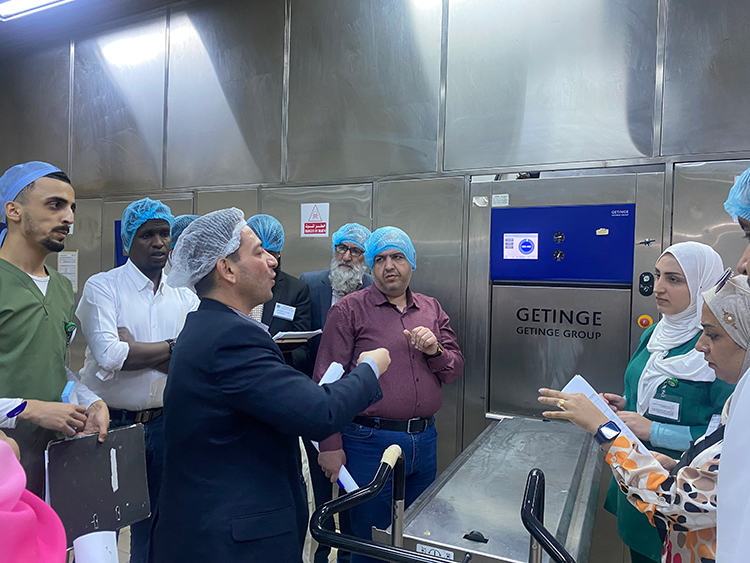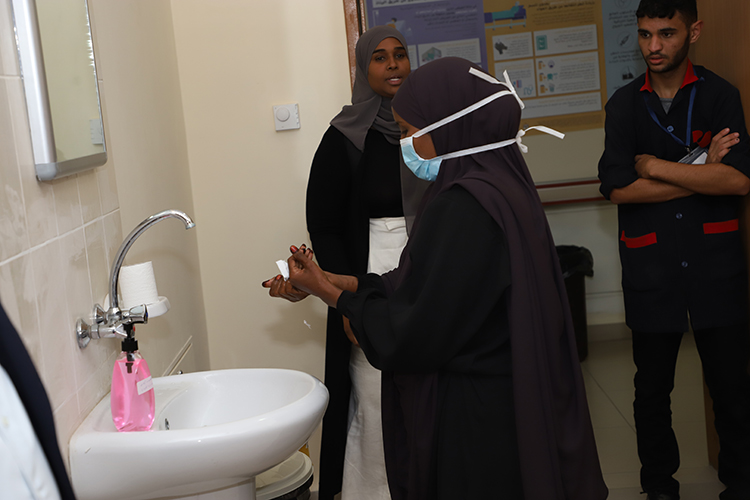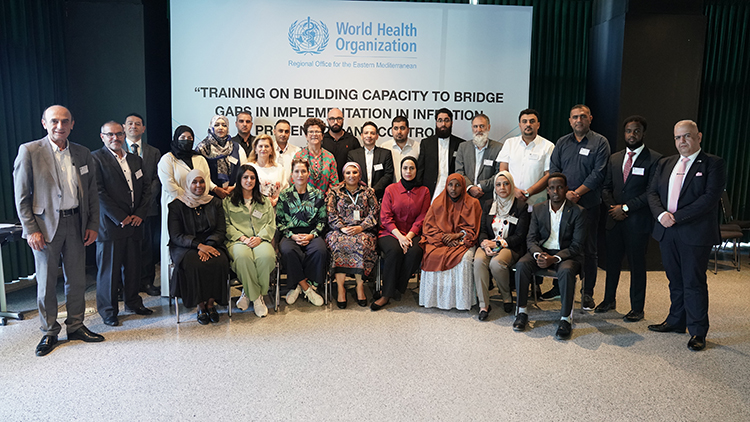 25 Oct 2023, Field visit to the very well-equipped central sterile services department (CSSD) at Zarqa Hospital, Jordan.
25 Oct 2023, Field visit to the very well-equipped central sterile services department (CSSD) at Zarqa Hospital, Jordan.
The WHO Eastern Mediterranean Region is at a critical juncture to capitalize on the momentum from the COVID-19 response. Turning temporarily scaled-up capacity in countries and territories into permanent capacities, agendas and networks will strengthen health security and systems for the future.
Infection prevention and control (IPC) is an area in which the Region made substantial gains during the COVID-19 pandemic. The Region has also historically been vulnerable to the emergence and rapid transmission of disease outbreaks and pandemics due to various demographic, environmental and socioeconomic factors. Such outbreaks include Middle East respiratory syndrome (MERS), avian influenza A (H5N1), cholera and dengue.
Prior to the COVID-19 pandemic, only 50% of the Region’s countries and territories (11 of 22) had established an IPC unit or programme, and just 45% (10 of 22) had developed national IPC guidelines. Since March 2020, 5 more countries have set up a dedicated IPC unit or programme (bringing the total to 16 of 22). By November 2023, 77% of the countries and territories (17 of 22) had devised IPC guidelines.
Prioritizing and sustaining these substantial gains made across most of the Region will enhance IPC implementation and preparedness for future responses. This will ultimately support health system resilience.
To guide such efforts, a 10-day training workshop was organized for national IPC focal points of the ministries of health of 8 fragile, conflict-affected and vulnerable countries: Afghanistan, Islamic Republic of Iran, Iraq, Jordan, Libya, Somalia, Syria and Yemen. Fragile, conflict-affected and vulnerable countries face unique challenges such as fragmented or destroyed health infrastructure and lack of safe water, sanitation and hygiene. Strengthening IPC capacities in such settings thus requires a distinct approach.
 18 Oct 2023, Field-based simulation exercises at Al Hussain New Salt Hospital, Jordan.
18 Oct 2023, Field-based simulation exercises at Al Hussain New Salt Hospital, Jordan.
The WHO Regional Office for the Eastern Mediterranean arranged the training with the WHO IPC Technical and Clinical Hub, and the King Abdulaziz Medical City Hospital (a WHO Collaborating Centre for Infection Prevention and Control and Antimicrobial Resistance in Riyadh, Saudi Arabia). The training took place in Amman, Jordan, on 16–26 October 2023.
The workshop:
equipped the national IPC leads with novel tools and indicators to lead and implement the core components for IPC in line with the WHO Global strategy on infection prevention and control;
discussed how to strengthen IPC interventions during health emergency preparedness, readiness and response; and
established a regional community of practice for IPC.
Various teaching strategies were used, with an emphasis on interactive discussions, group work, role-play, sharing of country experiences and lessons learned, field visits, and simulation exercises. Dr Jamal Abed Kadhim, IPC lead at Iraq’s Ministry of Health, enjoyed the training and networking opportunity: ‘’The workshop was not only a unique learning and practical experience, but it also provided us with a great opportunity to start a strong learning network with other regional colleagues.”
A request was made for each of the 8 countries to devise a small, independent IPC improvement project – to commence within 2 to 3 months of the end of the training – to ensure continuous growth and strengthen the existing partnership between Regional Office and the Member States. These small projects aim to shift the regional focus from supporting the implementation of IPC training to building internal capacity within a country.
Dr Elizabeth Tayler, Acting Regional Advisor for Antimicrobial Resistance and Infection Prevention and Control, Regional Office, reflected on the importance of robust IPC implementation in health facilities: “It has been a great opportunity to meet WHO country colleagues and government focal points in person and to have a frank dialogue and build capacities. This will ensure that IPC and other cross-cutting public health programmes, such as water, sanitation and hygiene; antimicrobial resistance; emergencies; and patient safety, are all integrated and linked to primary care and essential health services systems for higher quality and safer care.’’
 16 Oct 2023, The regional IPC training workshop in Amman, Jordan, was an excellent forum for national IPC focal points from FCV countries to learn from each other's experience and solidify a path forward to scale up IPC capacities in the FCV countries of the region.
16 Oct 2023, The regional IPC training workshop in Amman, Jordan, was an excellent forum for national IPC focal points from FCV countries to learn from each other's experience and solidify a path forward to scale up IPC capacities in the FCV countries of the region.


